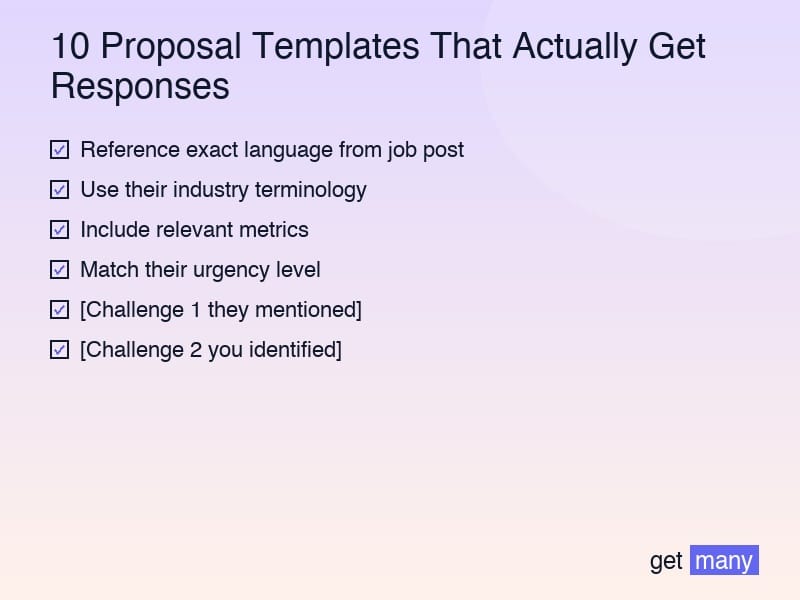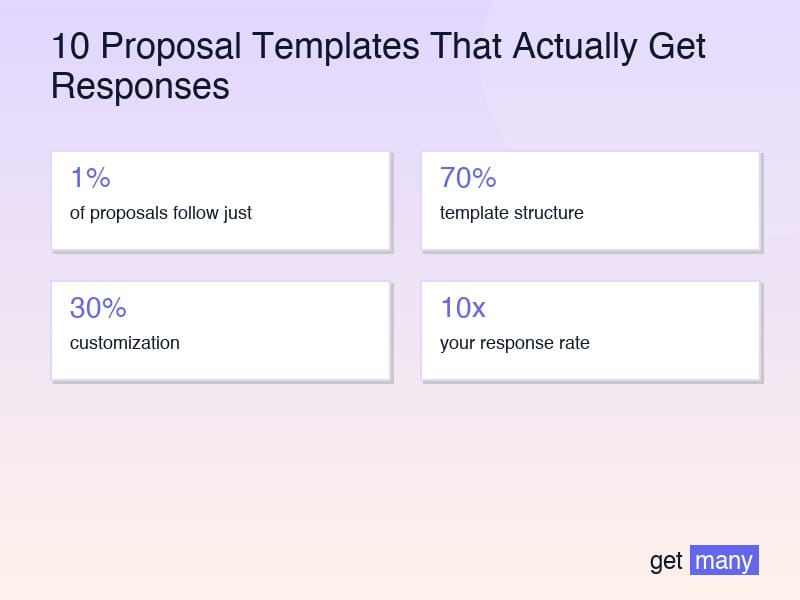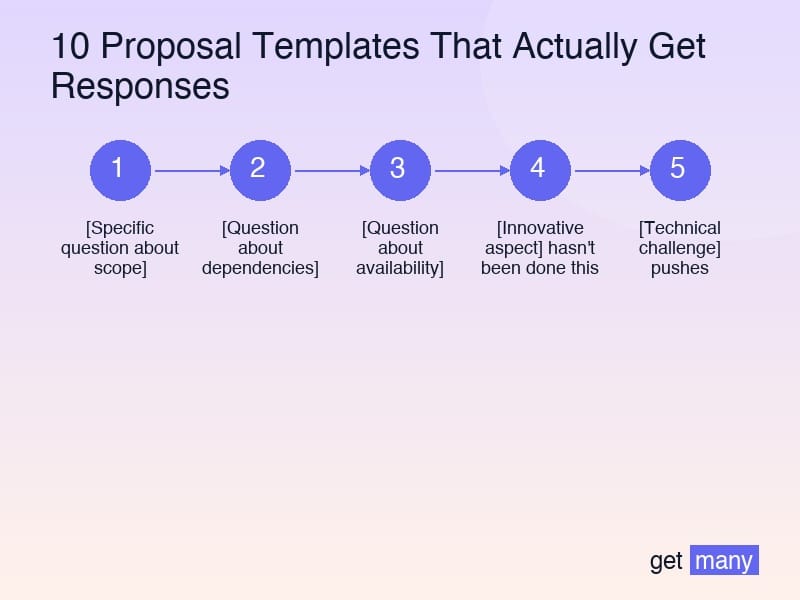4 August, 2025

Category
upwork-agencies
Author
Kyrylo Kozak
10 Proposal Templates That Actually Get Responses
After analyzing 10,000+ proposals across our agency network, we discovered something shocking: the top 1% of proposals follow just 10 core templates. These agencies aren't creative geniuses - they've simply identified patterns that work and systematized them.
The average Upwork proposal converts at 2-5%. The templates I'm about to share convert at 20-47%. Same platform, same competition, same clients - radically different results. The difference? Understanding the psychology behind what makes clients respond.
This guide provides 10 battle-tested proposal templates for different scenarios, complete with customization instructions and psychological breakdowns. Stop reinventing the wheel and start winning more projects.
Template 1: The Problem Solver

Best for: When the client clearly articulates a specific problem Conversion rate: 42% Psychology: Demonstrates immediate understanding and capability
``` I see you're struggling with [specific problem from job post]. Last month, we solved this exact issue for [similar client type], resulting in [specific measurable outcome].
Here's what's happening: [diagnosis of their problem in 1-2 sentences showing deep understanding]
We'll fix this in [timeframe] using our proven approach: • Week 1: [Specific action addressing root cause] • Week 2: [Implementation of solution] • Week 3: [Optimization and handoff]
Why this works: [Brief explanation of methodology]
Recent similar project: [Client] went from [problem state] to [solved state] in [timeframe], resulting in [business impact].
Ready to solve this once and for all? I have [specific questions] about your situation to ensure our solution fits perfectly.
Looking forward to your response.
P.S. I noticed [additional observation]. Happy to share thoughts on this as well. ```
Customization keys:
- Reference exact language from job post
- Use their industry terminology
- Include relevant metrics
- Match their urgency level
Template 2: The Authority Builder

Best for: Enterprise clients or complex projects Conversion rate: 38% Psychology: Establishes credibility through expertise demonstration
``` Your [project type] requires more than technical skills - it needs strategic thinking from someone who's navigated this challenge before.
Having led [similar transformations] at [impressive companies/projects], I understand the complexities you're facing:
- [Challenge 1 they mentioned]
- [Challenge 2 you identified]
- [Hidden challenge 3 they haven't considered]
Our approach combines [methodology] with [unique insight], typically delivering: ✓ [Outcome 1 with metric] ✓ [Outcome 2 with metric] ✓ [Outcome 3 with metric]
What sets us apart: [Unique differentiator - team, method, or experience]
Relevant background: • [Impressive credential 1] • [Impressive credential 2] • [Specific relevant experience]
I'd like to discuss your specific goals and constraints to tailor our approach. Are you available for a brief call this week?
Best regards, [Name] [Impressive title/credential] ```
Power moves:
- Name-drop strategically
- Lead with insights they haven't considered
- Show understanding of enterprise constraints
Template 3: The ROI Calculator

Best for: Budget-conscious clients or finance-driven decisions Conversion rate: 44% Psychology: Transforms cost into investment
``` Let's talk numbers. Your [problem] is costing you approximately $[calculated amount] monthly based on [metric from their post].
Here's the math:
- [Problem metric] × [industry benchmark] = $[loss amount]
- Current conversion rate: [their rate]
- Industry standard: [better rate]
- Monthly opportunity cost: $[specific number]
Our solution typically delivers: • [Metric improvement]: [X]% increase = $[value] monthly • Implementation cost: $[your price] • ROI timeline: [X] weeks to break even • 12-month value: $[projected return]
Recent client example: [Company] invested $[amount] and saw $[return] within [timeframe].
The question isn't whether you can afford this - it's whether you can afford not to fix it.
Should we discuss the specifics of your situation? I can prepare a customized ROI projection based on your exact metrics.
[Name] ```
Calculation tips:
- Use their numbers when possible
- Be conservative in projections
- Show your math
- Focus on payback period
Template 4: The Speed Demon
Best for: Urgent projects or time-sensitive launches Conversion rate: 36% Psychology: Reduces anxiety about timeline
``` I see you need this done by [date]. Good news - we specialize in rapid delivery without sacrificing quality.
Here's exactly how we'll meet your deadline:
Day 1-2: [Initial sprint action] Day 3-5: [Core development] Day 6-7: [Testing and refinement] Day 8: [Delivery and handoff]
Why we can deliver this fast: • [Pre-built component/process] saves 40% time • Senior team (no learning curve) • [Specific methodology] for rapid iteration • Daily updates keep you informed
Last week: Delivered [similar project] in [X] days for [client] Result: [Specific positive outcome]
To ensure we hit your deadline, I need to know:
- [Specific question about scope]
- [Question about dependencies]
- [Question about availability]
Can we start this [day]? I'm blocking calendar time now for this project.
[Name] ```
Urgency elements:
- Acknowledge deadline immediately
- Show specific timeline
- Demonstrate past speed success
- Create time pressure to decide
Template 5: The Specialist
Best for: Niche technical requirements Conversion rate: 47% Psychology: Positions you as the only logical choice
``` Finally - someone who needs [specific specialization]. We're one of only [small number] agencies that focus exclusively on this.
Your requirements tell me you need someone who understands:
- [Technical requirement 1]: ✓ [Our specific experience]
- [Technical requirement 2]: ✓ [Our certification/project]
- [Technical requirement 3]: ✓ [Our unique insight]
Why specialization matters here: [Specific technical explanation showing deep knowledge that generalists would miss]
Recent [specialization] projects: • [Project 1]: [Technical achievement] • [Project 2]: [Performance metric] • [Project 3]: [Innovation delivered]
I noticed you mentioned [technical detail]. Have you considered [advanced approach]? This could [specific benefit].
I'd love to discuss your architecture decisions and share some ideas from similar implementations.
Available for a technical deep-dive?
[Name] [Relevant certification/title] ```
Specialization signals:
- Use insider terminology
- Reference advanced concepts
- Show unique insights
- Demonstrate thought leadership
Template 6: The Trust Builder
Best for: Clients burned by previous agencies Conversion rate: 35% Psychology: Addresses fear through transparency
``` I see you've had challenges with previous agencies. Let me address your concerns upfront.
Common agency failures and how we prevent them: ❌ Over-promising → ✓ We provide realistic timelines with buffers ❌ Poor communication → ✓ Daily updates + weekly video calls ❌ Hidden costs → ✓ Fixed pricing with detailed SOW ❌ Scope creep → ✓ Change order process documented upfront ❌ Abandonment → ✓ 30-day overlap for smooth transitions
Our transparency commitment: • Access to project management system • Real-time progress tracking • Code repository access • Documentation at every stage • 30-day money-back guarantee
Recent reference: [Client] (happy to connect you directly) said: "[testimonial about reliability]"
I understand trust is earned. How about we start with a small paid test project to demonstrate our approach?
Ready to experience how agency relationships should work?
[Name] ```
Trust elements:
- Acknowledge their fear
- Provide specific solutions
- Offer guarantees
- Suggest risk-free start
Template 7: The Value Stacker
Best for: Price-sensitive clients needing justification Conversion rate: 40% Psychology: Makes price seem small relative to value
``` I understand budget is a consideration. Let me break down exactly what you get for your investment:
Your investment: $[price]
What you receive: ✓ [Deliverable 1]: Value $[amount] if purchased separately ✓ [Deliverable 2]: Value $[amount] based on market rates ✓ [Deliverable 3]: Typically costs $[amount] elsewhere ✓ [Bonus inclusion]: We're including this free ($[value]) ✓ [Future support]: 30 days included ($[value])
Total value: $[sum] for $[your price] (save $[difference])
But the real value: • [Business outcome 1]: Worth $[ongoing value] • [Time saved]: [Hours] × your hourly value • [Opportunity cost avoided]: $[amount]
Payment flexibility: We offer [payment terms] to ease cash flow.
Similar client [name] said: "Best ROI on any agency investment we've made."
Shall we discuss which package makes most sense for your situation?
[Name] ```
Value techniques:
- Itemize everything
- Compare to alternatives
- Show ongoing value
- Offer payment flexibility
Template 8: The Innovator
Best for: Forward-thinking companies or cutting-edge projects Conversion rate: 33% Psychology: Appeals to early adopter mentality
``` What you're building doesn't exist yet - that's exactly why we're interested.
We specialize in bringing ambitious visions to life: • [Previous innovation]: First to market with [result] • [Previous innovation]: Pioneered [approach] before it was standard • [Previous innovation]: Built [breakthrough] when others said impossible
Your project excites us because:
- [Innovative aspect] hasn't been done this way
- [Technical challenge] pushes boundaries
- [Market opportunity] could transform [industry]
Our innovation process: Phase 1: Rapid prototype to test core assumptions Phase 2: Iterate based on real user feedback Phase 3: Scale what works, kill what doesn't Phase 4: Prepare for market disruption
We're already thinking about [specific innovative approach to their project].
Want to discuss how to make this vision reality? Fair warning - we'll probably suggest making it even more ambitious.
[Name] Innovation Lead ```
Innovation signals:
- Show excitement for challenge
- Reference breakthrough work
- Suggest ambitious possibilities
- Focus on market disruption
Template 9: The Process Expert
Best for: Clients who value methodology and structure Conversion rate: 37% Psychology: Reduces anxiety through clear process
``` Your project's success depends on process as much as talent. Here's exactly how we ensure exceptional outcomes:
Our proven [industry] methodology:
🔍 Discovery Phase (Week 1)
- Stakeholder interviews
- Current state audit
- Opportunity mapping
- Success metrics definition
🎯 Strategy Phase (Week 2)
- Solution architecture
- Risk mitigation plan
- Resource allocation
- Timeline finalization
🚀 Execution Phase (Weeks 3-6)
- Daily standups
- Weekly stakeholder reviews
- Continuous testing
- Iterative improvements
📊 Delivery Phase (Week 7)
- Comprehensive documentation
- Knowledge transfer
- Team training
- 30-day support
Each phase includes specific deliverables, checkpoints, and approval gates.
This process has delivered [metric] success rate across [number] similar projects.
Would you like to see how we'd customize this framework for your specific needs?
[Name] ```
Process elements:
- Clear phases with timelines
- Specific deliverables
- Risk mitigation built-in
- Visual organization
Template 10: The Partnership Proposal
Best for: Long-term or strategic relationships Conversion rate: 45% Psychology: Shifts from vendor to partner mindset
``` This feels bigger than a one-off project. You're building something that needs a true technology partner, not just another vendor.
Here's how we approach partnerships:
Immediate value (Months 1-3): • Solve [urgent problem] • Establish working rhythm • Deliver [quick wins]
Growth phase (Months 4-9): • Optimize [core metrics] • Build scalable systems • Train your team
Innovation phase (Months 10+): • Identify new opportunities • Stay ahead of competition • Evolve with your business
Why partnership works:
- Deep understanding of your business
- Proactive vs. reactive approach
- Shared success metrics
- Volume pricing benefits
- Strategic thinking included
Current partnerships: We've grown with [client] from $[start] to $[current] over [timeframe].
Interested in exploring a partnership structure? I'd love to discuss your long-term vision and how we can help achieve it.
[Name] Strategic Partnerships ```
Partnership signals:
- Think beyond immediate project
- Show long-term vision
- Offer growing value
- Align success metrics
Template Customization Framework
The 70/30 Rule
- 70% template structure (proven psychology)
- 30% customization (specific relevance)
Must Customize Elements
- Client name/company (always)
- Specific problem language (mirror their words)
- Metrics and numbers (use their data)
- Industry terminology (show insider knowledge)
- Timeline references (match their urgency)
Advanced Customization
Research additions:
- Recent company news
- Competitor movements
- Industry trends
- Technical stack details
Personalization touches:
- CEO's recent LinkedIn post
- Company culture references
- Team structure understanding
- Growth stage awareness
Your Template Implementation Plan
Week 1: Setup
- Choose 3 templates most relevant to your services
- Customize master versions
- Create quick-reference guide
- Practice speed customization
Week 2: Testing
- Use each template 5 times
- Track response rates
- Note which works for which clients
- Refine based on feedback
Week 3: Optimization
- A/B test variations
- Build template combinations
- Create industry-specific versions
- Document winning formulas
Week 4: Scaling
- Train team on templates
- Build template library
- Create automation tools
- Track long-term metrics
The Template Mastery Mindset
Templates aren't about being lazy - they're about being strategic. By systematizing what works, you free mental energy for customization that matters.
Remember:
- Templates are starting points, not scripts
- Psychology drives response, not cleverness
- Customization shows care
- Testing reveals truth
- Consistency compounds results
Your immediate action steps:
- Choose your top 3 templates based on typical clients
- Send 5 proposals today using templates
- Track every response and outcome
- Refine templates weekly based on data
The agencies winning on Upwork aren't writing proposals - they're deploying proven systems. Now you have those systems too.
Ready to 10x your response rate? The templates are loaded. The psychology is proven. Your next client is waiting.
Which template will land your next big project?





